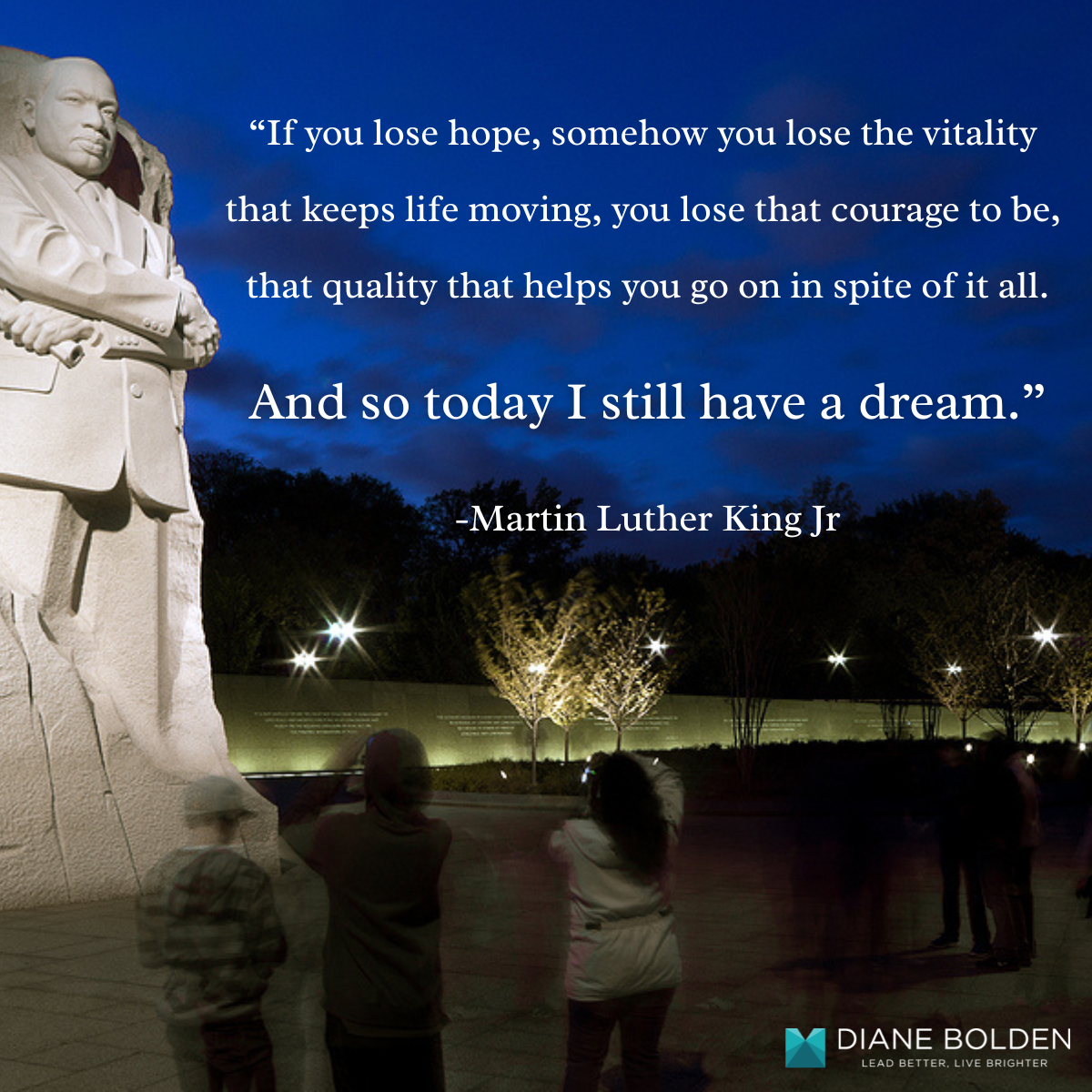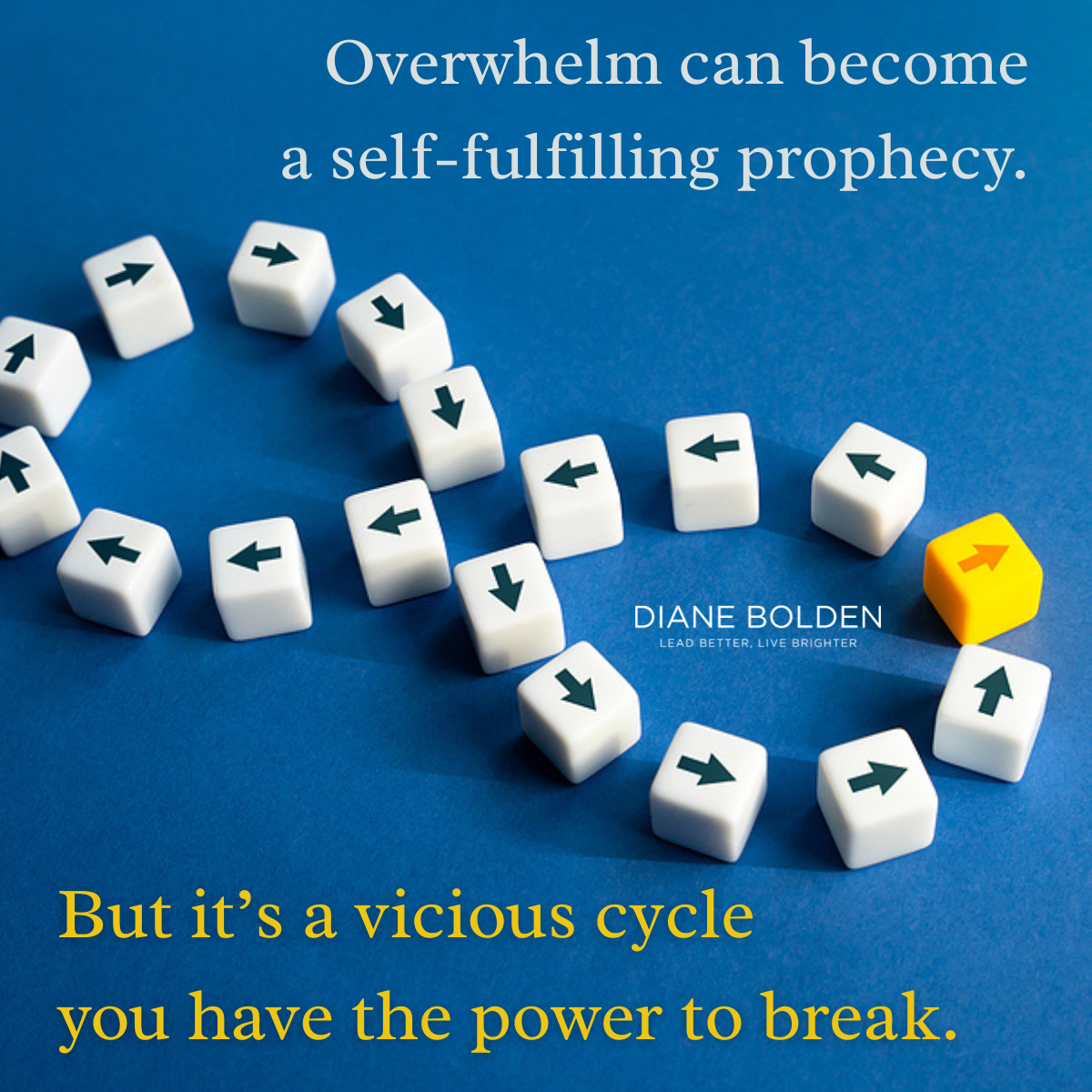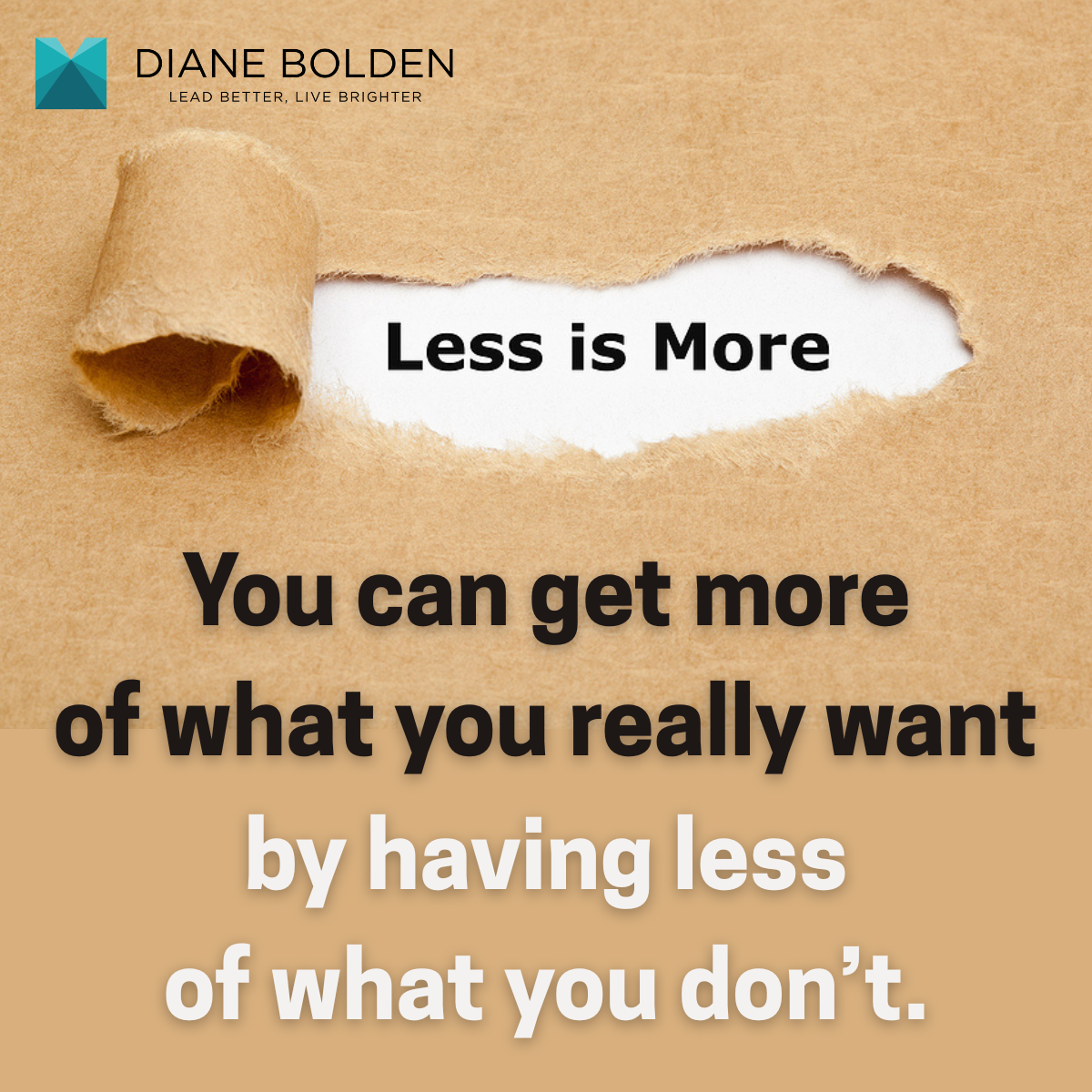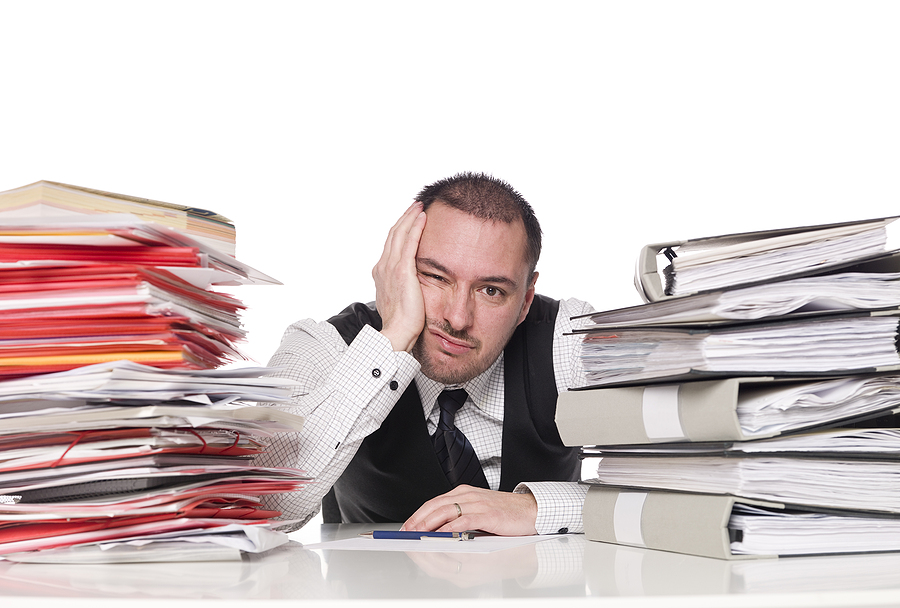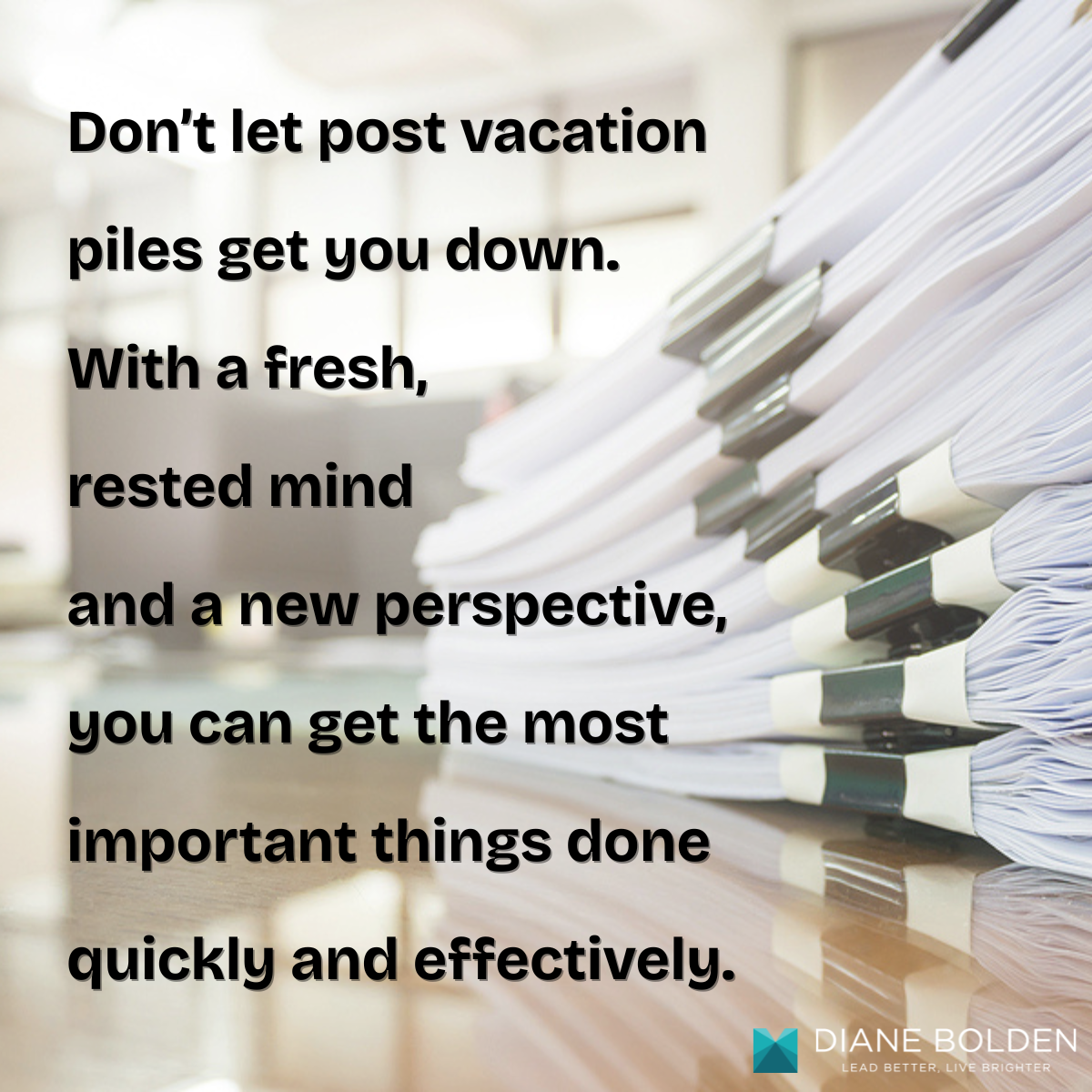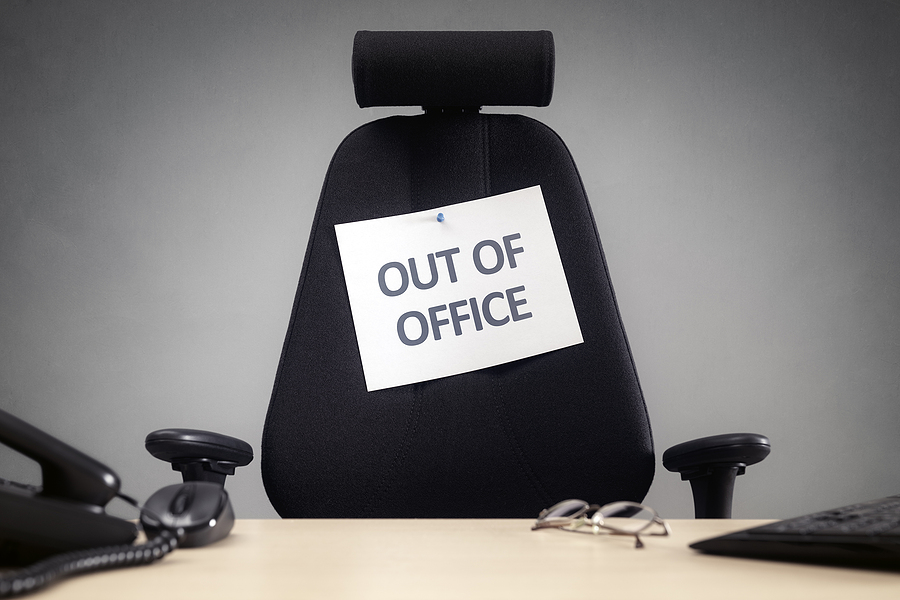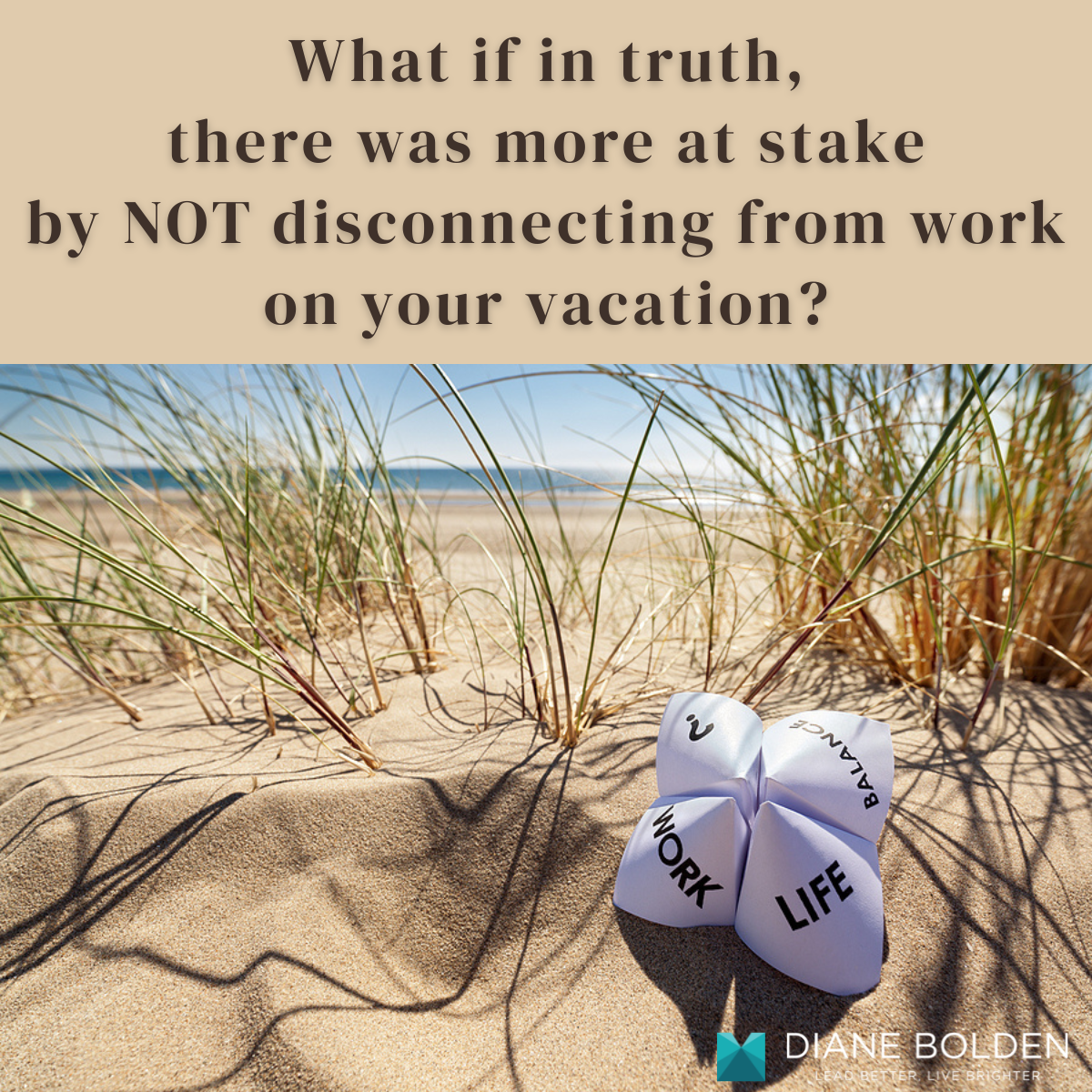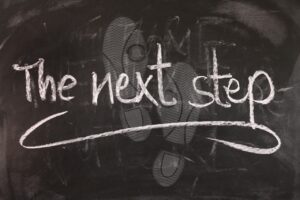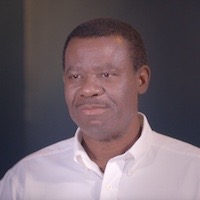Category Archives: Productivity and Effectiveness
Do You Dare to Dream?
As children, most of us received mixed messages. You may have been encouraged to follow your heart and give life to your dreams in addition to being conditioned to be practical, hedge your bets, and take the safest route. Over time, many of us have allowed the roar of public opinion – that often tells us our dreams are frivolous, selfish, and unlikely to come to fruition – to silence that small still voice within.
But those among us who have risen against their odds have learned to reverse that process and believe in themselves and their dreams despite the overwhelming evidence around them that would suggest that success is improbable.
Listen closely to the silent whispers of your heart that beckon you to think bigger and act bolder – and to bust out of old paradigms that feel stale or stagnant.
Do what you can to gain clarity on what they are telling you.
And then take action.
For more on taking steps to bridge the gap between where you are and where you want to be – and to receive updates on an upcoming webinar that’ll help you make the most of 2026, download my special report, “Why Real Leaders Don’t Set Goals (and what they do instead)”.
Why overwhelm can become a self-fulfilling prophecy – and how to break the vicious cycle
When you feel heavy and bogged down, everything you do becomes harder and more cumbersome.
You may think the way you feel is a result of your experiences, and that’s true — the more you have to do, the more overwhelmed you’ll feel. But the reverse also applies — the more overwhelmed you feel, the more you are likely to act in ways that exacerbate it. You might procrastinate, overcomplicate things, or waste energy resisting and worrying.
If you focus on evidence suggesting you’ll never rise above the way you are feeling, you’ll trap yourself in vicious circles where you’ll continue to see what you want to rise above and feel the frustration of being unable to break free.
In fact, your frame of mind with everything you do has a direct effect on whether the experience of doing it will be exhilarating and satisfying or frustrating and heavy.
The stories we tell ourselves have a way of coming true. The way out of self-imposed traps is to start not with our experiences, but our thoughts.
The fundamental shift must come not in what you do, or even how you do it, but what you are thinking, believing and allowing yourself to feel about what you are doing.
To that end, setting an intention or statement of your desired experience can be very powerful. If you want greater freedom and joy, more meaning and satisfaction, and heightened effectiveness, you must align your thoughts around enjoying those experiences before you even start.
And you need to become diligently aware of the degree to which your thoughts stay aligned with your overarching intention. When they drift, you can return to them, remember what you really want, and align yourself with the state you wish to be in again.
In this way, you can break the vicious cycle of allowing your experiences to bring you down in ways that result in more lousy experiences — and begin anew. Your actions align with your thoughts, and you’ll find yourself coming up with creative ways to simplify, get focused on what is most important, and get it done while enjoying yourself in the process – and sharing your joy with everyone around you.
Looking for a better way to lighten your load? Check out UnleashtheExtraordinary.com.
Here’s to your success!
Diane
Want to do more? Start by doing less.
Want to Do More? Start by Doing Less
We are a goal driven society that is conditioned to seek more.
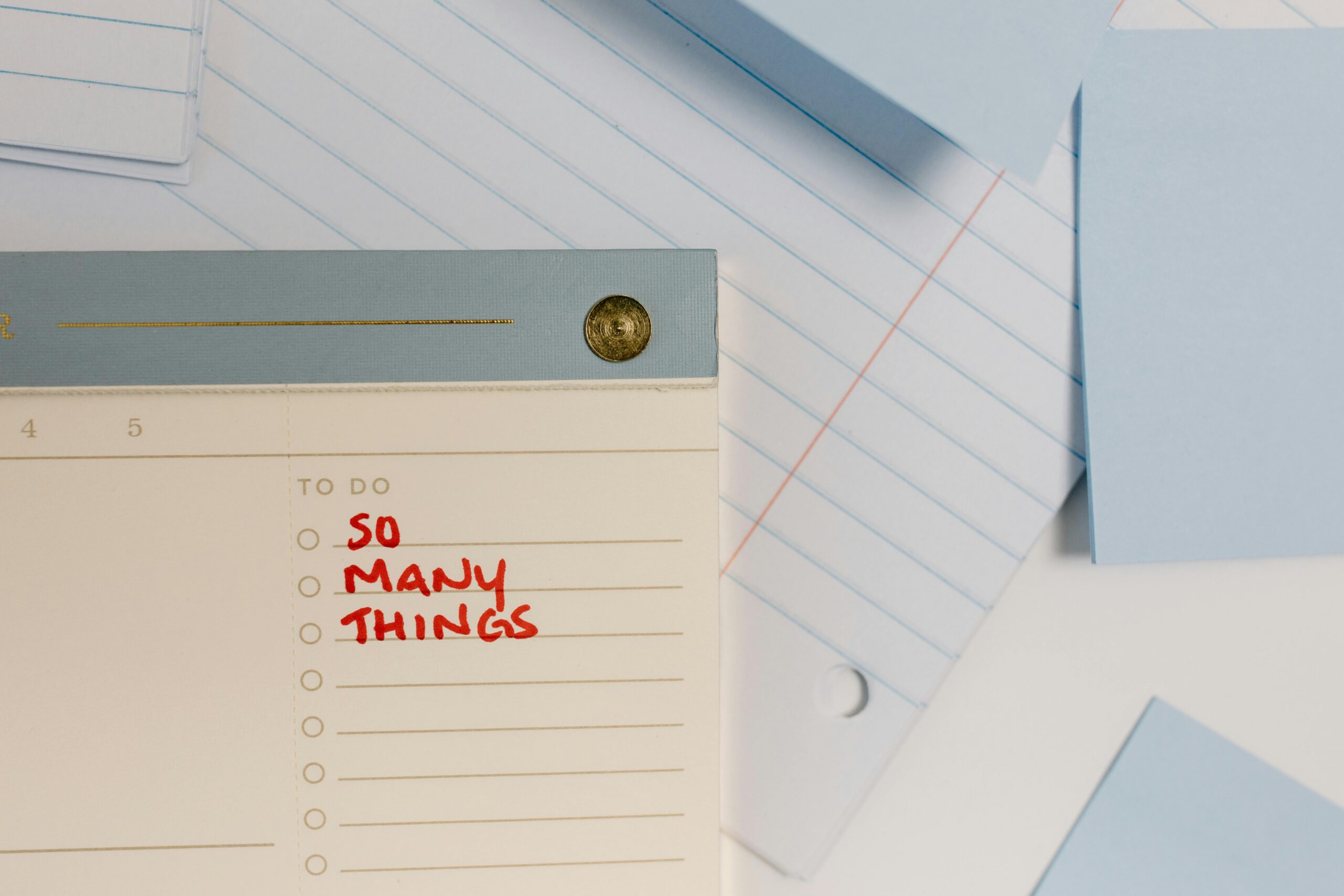 Our egos desire more money, more fame and prestige, and more stuff. But a deeper part of ourselves longs for more peace, more meaning, and more purpose in our lives. We want to move beyond our previous realizations of what we’ve already accomplished to master newer, better ways of doing things – whether that be what we create in our lives or in our organizations – and as leaders what we can inspire others to do as well.
Our egos desire more money, more fame and prestige, and more stuff. But a deeper part of ourselves longs for more peace, more meaning, and more purpose in our lives. We want to move beyond our previous realizations of what we’ve already accomplished to master newer, better ways of doing things – whether that be what we create in our lives or in our organizations – and as leaders what we can inspire others to do as well.
What if you started with less instead of more?
Just for a moment, consider what you need to let go of to create the space for something new to come in.
You can take your cues from nature. We are officially in the first week of fall – a time of letting go and preparing for regeneration. Trees shed their leaves, and the energy of plants is directed toward developing a strong root system that’ll help it make it through the winter.
As the days will grow shorter and we spend more time in the dark, it’s fitting to reflect on things you may not be able to see but feel welling up within you.
What are you holding onto that has run its course?
- What are the old, outmoded ways of doing things that no longer bring you energy?
- What things have you acquired that you no longer need?
- What beliefs are you holding onto that are no longer true for you?
In moments that you feel constricted, anxious, or tired ask what you can let go of. Don’t be afraid of the answer. Though it may be uncomfortable because it introduces an element of the unknown, following these insights will always lead to freedom and liberation.
Your computer can only handle so much data, and the same is true of you.
If you don’t delete old emails and files and continue to add new programs without uninstalling old ones, you’ll find that it becomes sluggish and unresponsive. Just as freeing up space allows your computer to process things more quickly, so too will clearing your own personal space (whether of things or thoughts) allow you to access new levels of clarity and creativity.
Space brings freedom.
You’ll breathe easier, be more present in every action and interaction you partake of and bring more of who you really are to what you do. And you’ll open the space of possibility that allows something to come in that may surprise and delight you.
Any work you do on yourself will serve as a form of leadership for others who, like you, seek their own answers and could benefit from your example of unearthing what is possible and allowing it to take form in new and unexpected ways.
Discerning what is and isn’t working and up leveling your game becomes easier and more fun when you have support. When you are ready to go deeper, check out UnleashtheExtraordinary.com.
My Cringe Worthy Epiphany
I almost didn’t post this video. It was filmed back in June – and I initially cringed when I reviewed it. But in the spirit of learning and growth, I decided to share it anyway…
I was in the middle of creating my series on learning to break habits that are hurting you. And I had this experience that made me realize how we get stuck in habits that work against us in the first place.
It’s kind of embarrassing. But you know what? That’s life.
Often, it’s those awkward, even humiliating moments that provide us with insight, wisdom, or at the very least a little levity.
Maybe you will relate…
To your success!
Diane
How to Get Those Engines Running Again
Over the last several weeks I’ve been posting tips for leaving and returning from vacation. I took my own advice and prepared those articles to go out while I was enjoying some out of office time of my own.
But now I’m back. And I had a few more insights about how to get back in the swing of things as I navigated my own re-entry. This week’s video features four tips that helped me get back into my groove – and I’m confident they will help you too.
While these suggestions are timely after you’ve returned from being away from the office, they are also entirely fitting for anytime you are having trouble getting something done, approaching a project you’ve been putting off, or stuck in the middle of something that has you feeling stalled.
Here’s to coming back better and brighter!
Diane
How to Work Quickly and Effectively Through Post Vacation Piles
You’ve returned from a fabulous vacation feeling like everything that happened while you were away has coagulated into an overwhelming pile that seems completely impermeable.
Now what?
In my last post, I discussed the second vital strategy for coming back strong after your vacation: (2) Take advantage of the opportunity to see things from a fresh perspective. A part of that strategy included identifying all the things that are competing for your attention. Not as a “to do” list, but rather an inventory of potential items to be addressed.
Getting things out of your head has a way of freeing up your mind. But that sweet release is quickly replaced with angst and anxiety if you believe you must accomplish all that is written there. That’s when overwhelm sets in and threatens to get in the way of action.
That leads us to the third strategy…
(3) Use discernment to determine your highest priorities.
Take a moment to get clarity on your most important desired outcomes. See if you can go beyond the outcomes themselves to dial in what those accomplishments will give you – forward momentum? closure? pride in your work?
Now, from that mindset, ask yourself the following questions,
- Which of the items listed are truly most important?
- What needs to get done right away, and what can be deferred?
- What MUST I do myself? And what could I delegate to others?
- What, if anything on this list, really doesn’t need to get done at all (or could be minimized in some way?)
Once you’ve identified your priorities, start with the most important. If you can focus on one thing at a time and bring all your presence to getting that thing done, you’ll do it more quickly and effectively. And then you can move onto the next thing with the same laser focus and intensity.
Remember, one of the important functions of taking a vacation is to allow yourself the rest, relaxation and recharge necessary to come back to your work with new vitality, energy and enthusiasm. It could usher in a whole new way to simplify your life and work and focus on bigger, more important, strategic ventures and initiatives.
Approaching your post vacation re-entry by taking the steps outlined above (and covered in previous posts) will allow you to leverage your time away to unleash new levels of performance in yourself, as well as those you lead.
If you want to learn to infuse your work year-round with the same freshness and inspiration you feel after a good vacation, message me to learn about a new program I’ll soon be making available to a limited number of executives.
How to Ease Post Vacation Re-entry
No matter how much you love your work, returning from vacation can be difficult.
The barrage of emails, phone messages and projects that often pile up can feel heavy, burdensome and downright overwhelming. You may feel soft and ill equipped to address them. After all, it took a while to settle those engines down. And there is only so much even the boldest of coffee can do for you.
 But vacation re-entry doesn’t have to be a stress filled experience.
But vacation re-entry doesn’t have to be a stress filled experience.
In fact, when you approach returning from vacation consciously and intentionally, you can make the most of the relaxation you enjoyed in much the same way that you maximize any investment. That precious down time you allowed yourself can put you ahead of the curve rather than behind it.
This week and next, I’ll be exploring strategies for doing just that. Let’s start with the first…
(1) Get clear on what you most want.
The beauty of a vacation is that it allows you to get some distance from the myriad of little things that keep you from seeing the bigger picture in your life. You can reconnect with what’s most important to you – and get clarity on what you want more of and less of.
It often happens on more of a feeling level than a thinking level. You may find yourself buoyed by possibility, even if you aren’t sure exactly what it is. Time away ushers in new energy that allows us to feel life could be so much simpler, richer, satisfying and fulfilling.
Don’t let that feeling disappear just because your vacation has come to an end. Before you jump back into your work, tune into the bigger picture of what you want to experience and see if you can feel it as though it already exists.
Do you want more simplicity? To cut through complexity with confidence and ease? To infuse your work with more optimism and lightness?
How do you want to feel at the end of the day? See if you can go there and experience it now. Imagine yourself driving home feeling grateful for what you accomplished and enthusiastic about what is on the horizon. Then return to the moment and approach your day from that frame of mind.
Tuning into the mindset that will keep you in sync with your vision will guide your actions in ways that are most likely to bring your desired state to fruition. So, lock it in, and commit to staying aligned and returning to that conscious state of mind if and when something momentarily steals your focus.
If you want to learn to infuse your work year-round with the same freshness and inspiration you feel after a good vacation, message me to learn about a new program I’ll soon be making available to a limited number of executives.
Next week, I’ll post about the second strategy for coming back strong after your vacation: Take advantage of the opportunity to see things with a fresh perspective.
How to Use Your Vacation to Strengthen Your Team (and your organization)
It’s not uncommon to return from vacation feeling like you need another vacation. But it doesn’t have to be that way. If you approach your time away with the same level of thoughtfulness and intention that you do with any project you undertake, you can turn that around.
Three strategies will help you create vacation experiences that not only revitalize you and supercharge your performance but also increase the strength and effectiveness of your organization. I posted about the first strategy last week: Make the decision to completely disconnect from work.
This week, we’ll move to the second strategy…
(2) Prepare people in your organization to handle things in your absence.
Most executives would benefit by delegating and empowering others more in general. Often senior leaders find themselves unable to act strategically because they get bogged down in operational tasks that they really shouldn’t be involved in. So, creating a plan to prepare others to run things in your absence will yield dividends for you (and your organization) long after your vacation is over.
Take some time to identify what is most likely to hijack your relaxation, and plan accordingly.
Identify people in your organization whose skills, experience, and passion are a good match for things you would normally handle yourself. Then take the steps necessary to bring them up to speed and put them in charge while you are away.
Create and communicate guidelines that will help them know what to do in situations that would cause you the greatest stress, so they can make solid decisions without you.
Taking these steps not only helps ensure consistency and effectiveness while you are away. It also develops key players on your team that, given the right opportunities, can make a bigger impact.
When you return, follow up to help your people integrate what they have learned and build on it.
In addition to increasing their own capability, their fresh perspective may yield insights into how things can be handled more effectively in the future. And the confidence you place in your staff can go a long way toward making them feel valued and appreciated.
Implementing this strategy for how to disconnect from work on vacation will allow you to open doors to new levels of performance that benefit your entire organization.
Next week, I’ll share with you the third strategy for disconnecting from work, so you can enjoy your vacation, return feeling refreshed and ready to reengage at a higher, more effective level, and set a powerful example for your people about how to maximize their own performance.
If you want to learn to infuse your work year-round with the same freshness and inspiration you feel after a good vacation, message me to learn about a new program I’ll soon be making available to a limited number of executives.
Why You Can’t Afford NOT to Disconnect from Work on Your Vacation
We all know we need vacations… time to rest and recuperate, enjoy our loved ones and have some fun. But all too often, being away creates stress for high-performing executives who dread coming back to loads of work that has piled up.
How can you truly leave work at the office while you’re on vacation, so you don’t spend your time away preoccupied or getting sucked into email and phone calls?
Over the next few weeks, I’ll be posting strategies to help you do just that. Let’s start with number one…
(1) Make the decision to completely disconnect from work.
We all know our electronic devices need to be recharged to work properly. And it’s a no-brainer that they charge more efficiently when we’re not using them. However, we often fail to grasp that to replenish our energy, creativity, resilience, determination, and focus – we too need to go offline.
It is often our underlying (and unexamined) assumptions that keep us from truly relaxing.
We’re conditioned to believe that the harder you work, the more successful you’ll be, and that taking your eyes off the ball (even for a day, let alone a week or more) can lead to things spiraling out of control. As a result, many of us have a hard time letting go.
We approach our vacations with one foot in and one foot back in the office, checking our phones and becoming preoccupied with work. In this state of mind, it’s easy to get sucked back into anything that appears to be less than optimal.
Few of us realize that the belief we can’t afford to let go is the problem, which is why so many struggle with how to disconnect from work on vacation. Perhaps in reality, this belief causes more problems than it solves.
- Like your cell phone, which is constantly searching for a signal and downloading messages, you too are expending energy even as you try to recharge it.
- You become far more susceptible to distractions that take you away from what you are doing in the moment.
- And before you even leave, that belief will keep you from doing the preparation necessary to ensure that others can handle things without you while you are away.
Once you realize this underlying belief is the culprit, you can substitute it with a new truth.
You can begin to entertain the possibility that disconnecting will truly serve you (and your organization) and act in ways that make that true. And when you fully commit to a vacation that allows you to go offline, you are better able to prepare in ways that make that possible.
This leads to the next strategy, which I’ll be sharing with you in my upcoming post next week…
If you want to learn to infuse your work year-round with the same freshness and inspiration you feel after a good vacation, message me to learn about a new program I’ll soon be making available to a limited number of executives.
A Simple Little Secret for Overcoming Inertia
Is there something you’ve wanted to do that you just can’t get yourself to act on? You may dream and scheme, and even have a plan for moving forward. But for whatever reason, you just haven’t been able to execute it. Overcoming inertia is a common challenge, and it can keep you from your best work. But it doesn’t have to.
You’re probably familiar with the law of inertia. According to Merriam Webster, inertia is “…the inherent property of a body that makes it oppose a force that would cause a change in its motion. A body at rest and a body in motion both oppose forces that might cause acceleration.”
So, anytime you aspire to do something different, whether changing a habit or behavior, beginning a new endeavor, or creating anything – overcoming inertia is going to be a necessary and unavoidable part of the process.
It’s a powerful force. Because it’ll lead you to believe that whatever you are about to do is going to be hard. And you may end up telling yourself stories that’ll keep you stuck. You might convince yourself that whatever you are about to do is too complicated. Or that it’ll require too much work. Or that you don’t have the talent, energy, or wherewithal to endure it.
But what if the secret to overcoming inertia is to actually use the principle of inertia itself?
What if all you had to do to launch your new endeavor, habit, behavior, creation – or whatever you aspire to do – is just take some small action?
What if you don’t need to have it all figured out? …all your ducks in a row? …a multi-phase plan that maps every requirement, every step, and every contingency?
What if all you need to do is just START something?
Open a word doc and start writing. Pick up the phone and make a call. Go for a walk. Just get into action – and create new momentum – that is in alignment with whatever you ultimately want to accomplish.
If inertia is a force that leads us to continue doing what we’ve done before, by definition even the tiniest change in trajectory will begin to create a new force in a different direction.
Perhaps in this way, the smallest actions can ultimately lead to the biggest accomplishments.
I experienced the power of this a while ago, on a cold February day in Phoenix, Arizona. And on a whim, I filmed a little video to capture my epiphany…
FULL TRANSCRIPT
Hi, Diane Bolden, executive coach and author of “The Pinocchio Principle: Becoming a Real Leader.” And I just finished my morning ride. The thought hit me to shoot a video.
It’s cold here in Phoenix, which is crazy. I know. Wa, wa. But it was 35 degrees this morning, which is cold in Phoenix in February. And I did not want to get out of bed. And I did not want to ride the exercise bike. But I did it.
And I had an insight while I was riding that I wanted to share with you. What I realized is that it was hard to get on the bike because I was cold and I had to push through that resistance.
But now I’m warm. I’m actually kind of hot.
And I was thinking about how this is kind of like a metaphor for life… because whenever you start something new, you feel kind of cold. And you don’t want to. And there’s a lot of resistance.
[NOTE: Starting something new requires overcoming inertia – the momentum of whatever you were doing before that may be keeping you from doing what you’d like to do next. But… you can use the force of inertial to overcome inertia.]
And the more you give yourself to it – the more you allow yourself to kind of be in the game and push, (and I don’t mean push in a negative way, I just mean to get warm, to get your feet wet, to start something somewhere), what’s interesting is the environment doesn’t change…
It’s still very cold outside, and in here, but my body’s warmer and I have the ability to do things that I couldn’t do when I first woke up. And isn’t that just the same thing with life?
We start off and we’re cold. The environment doesn’t change, the circumstances don’t change. But if you allow yourself to get in the game and to get a little warm, and to move a little bit, you might find that you change.
And when you do, you’re capable of doing things you maybe didn’t think you could.
